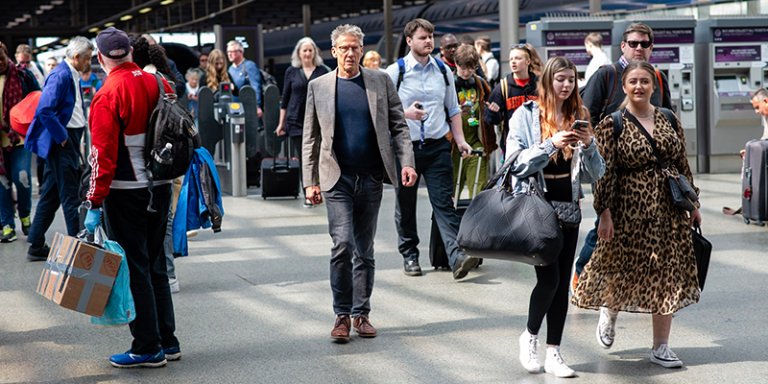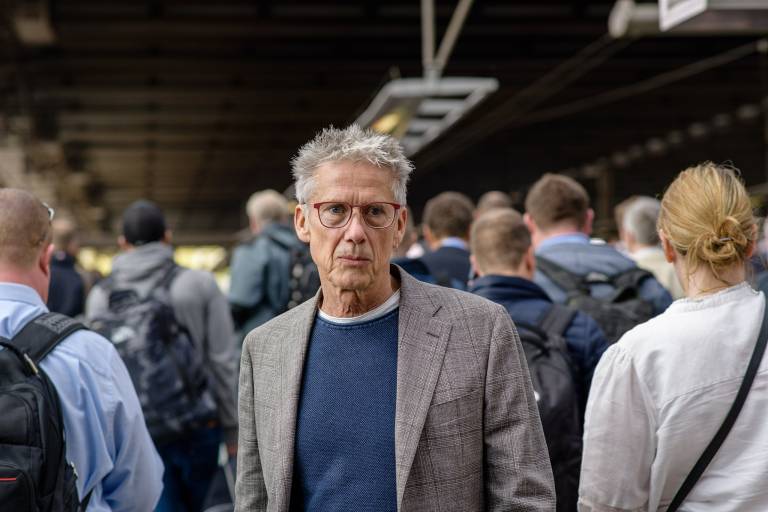Crossing borders with Christian Dustmann
6 August 2023
We speak to the renowned economist Christian Dustmann about the events and experience that have shaped his life and work. And how as Founding Director of the Centre for Research and Analysis of Migration (CReAM) he’s helping build better policy.

This article originally appeared in the UCL Policy Lab Magazine.
Crossing borders is something Christian Dustmann was doing long before he became an academic. The Professor of Economics and Director of UCL’s Centre for Research and Analysis of Migration (CReAM) looks at a range of issues from labour, migration, and integration.
I meet him in his office, relaxed and casual, a world away from most people’s stereotype of a successful academic. And, indeed, he speaks openly about his lack of early interest in becoming a scholar.
“I grew up in what you would call in this country a working-class area. All my friends were mechanics, carpenters, or plumbers—people who did apprenticeship training. Even going to university never really crossed my mind, let alone becoming an academic.”
Growing up as he did in a divided Germany, Dustmann saw first-hand the everyday experiences borders and economic divides had on the lives of ordinary people. I put it to him that this experience of everyday problems might have led him to have a better understanding of how theoretical ideas interact with human realities.
“Possibly. Most labour economists never really worked these kinds of jobs.”
His trademark leather jacket is slumped over his office chair. This too has a backstory. In those early years, his ambition was to afford a motorcycle and drive across Europe. When he graduated from high school, all he had in his head was to buy a motorcycle. But that meant having to find a job or an occupation, leading him to his first experience of crossing borders.
During his military service, Dustmann learned to drive trucks. And as a young man that meant his choice of occupation seemed obvious – truck driver.
“I was driving trucks internationally. From Germany to Italy to Greece, to Spain to France. All these European countries. I loved that. In the beginning, it was pure adventure.”
This sense of possibility and the new excites Dustmann to this day. The interchange of ideas across intellectual borders and experience. His recent work is noted for its willingness to answer the pressing questions posed by policymakers in society – questions that do not respect the boundaries of academic disciplines. It has been the hallmark of his success.

Dustmann and the Centre CReAM he directs have been helping inform our understanding of migration for over twenty years. This work is enabled by a huge capacity for data gathering and analysis, which has allowed him and his colleagues to look at other questions. A recent paper looked at the impacts of crime on young people. Identifying how early intervention with vulnerable individuals can greatly affect the risk of criminality later in life.
Much of this work centres around questions that Dustmann has been posing all his life. How can we make smarter decisions? How can research work in collaboration with communities and governments to make society a better place? But for Dustmann, it also means ensuring we defend and strengthen the shared bonds that underpin our societies.
I put it to him that growing up in Germany in the ‘70s and ‘80s under the shadow of past suffering and present division must have given him a precious understanding of the fragility of an open society.
“I was born not even two decades after the end of the Second World War. For me, the horrors of that war and the crimes my country committed were always something which tortured me. And I always wanted to find answers for how that could happen. And during those years that seemed so alien and so far away.”
With the rise of nationalism across Europe and the spectre of populism once again looming over democracy, Dustmann believes academia and universities have a vital role to play in strengthening the foundations of our democracy. But for Dustmann, it is not a momentary thought; it goes to the core of what being a university is about—bringing people and ideas together to understand our world and perhaps leave it in a better shape.
He may have been born under the shadow of that history, but he also came of age at a time of possibility and hope. A fact that does not escape him—the moment when out of division and darkness came hope and light.
“When I was just growing up, I had a total assumption that the separation of Germany was something which would go on forever.” Then came the collapse of the GDR and the fall of the wall.
“As we watched on TV, the wall coming down that night, it was a very emotional moment. And the period afterward was a period of excitement and expectation.”
As Dustmann speaks, I cannot help but think that he embodies so much of that hope for a better world. A world that may be under threat and yet is one worth fighting for.
For Dustmann, that means doing as he always has, finding possibility and hope in ideas. Working to understand the world around us and working with those who want to help improve it.
Speaking to him today, far from the small West German town where it all began, I am reminded that Dustmann has seen the best and worst politics can offer. And you get the feeling that makes him even more driven to work for what is best.
Christian Dustmann is Professor of Economics at University College London (UCL) and the founding Director of the Centre for Research and Analysis of Migration (CReAM)
 Close
Close

